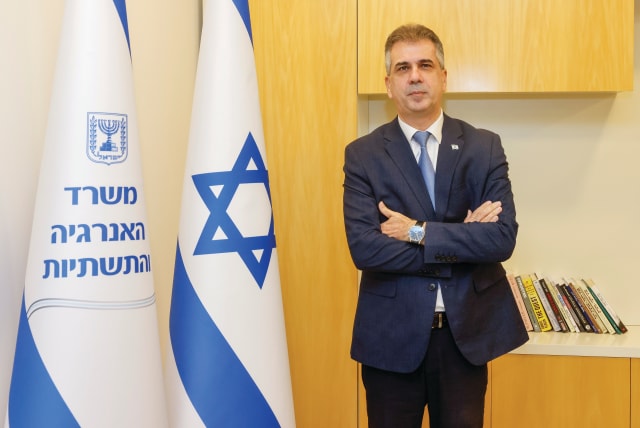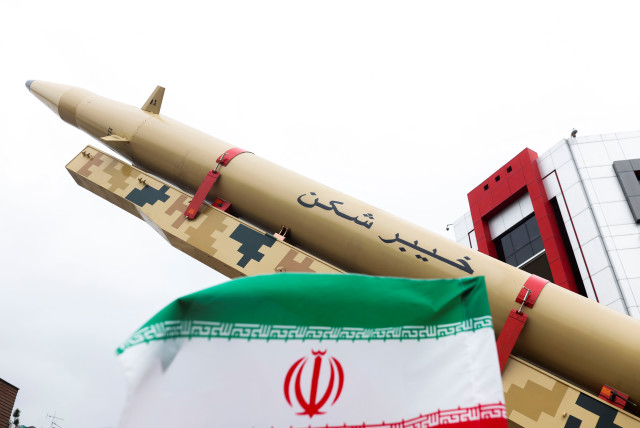Israel-Saudi deal hinges on Iran, Energy Minister Cohen says

Newly installed Energy Minister Eli Cohen believes the threat from the Islamic Republic, not the Palestinians, is the reason Saudi Arabia will make peace with Israel.
With his eyes toward a Saudi normalization deal with Israel once the Gaza war is over, and in opposition to Palestinian statehood, Likud politician Eli Cohen took up his new role this month as energy minister.
His building is just around the corner from his former office, where he served as foreign minister for a year.
The tall, slim, silver-haired Likud politician steered the country’s foreign policy in 2023 for nine months with the hope of regional peace, but found himself in the last three shoring up diplomatic support for the war against Hamas, following the terrorist group’s October 7 attack.
But the war and the increased Arab public anger against Israel it has sparked, has not dimmed his belief that such a peace deal is possible. His new office, much like his old one, puts him in the center of the issue, except instead of building bridges for Israel through diplomacy he will be doing it through regional and European energy projects.
He has a one-word central answer to the question of why he is so certain that Israel is on the verge of normalized relations with its neighbors – and that is “Iran.”
A brown block with large, white-colored words “United Against Nuclear Iran,” from the US-based nongovernmental group dedicated to that goal, sits on Cohen’s shelf, next to a stand-alone pole with an Israeli flag, in his mostly bare new office.
The international community is talking about the Palestinians and a two-state resolution to the conflict as the best way to prevent another October 7 attack. Cohen, however, is talking about the Iranian threat, including the one that Israel faces in its multifront conventional battles with the Islamic Republic.
“It’s important to emphasize to the world, we are not [just] fighting Hamas,” Cohen said during an in-person interview with The Jerusalem Post.
Israel is battling Iranian proxy groups – Hamas, Islamic Jihad, Hezbollah, as well as militias from Syria and Iraq.“So actually we are fighting Iran at the end of the day. We are fighting the war of the free world. We are fighting against Iranian aggression,” he said.
If a full war breaks out along the northern border with Hezbollah, which is entrenched in Lebanon, Cohen said, “it will be a war with Iran. When you are fighting Hezbollah, you are actually fighting Iran.”
"Lebanon does not want war"
The Lebanese government itself does not want war with Israel, he said.
“I receive [third-party] messages from the government in Lebanon, not direct messages, but through my colleagues and counterparts in other countries [in which the Lebanese are saying], ‘We don’t want to have a war with Israel.’“We say, ‘We don’t want to have a war either, but restrain Hezbollah.’
“They say, ‘We don’t control Hezbollah’ and ‘Hezbollah receives instructions not from Beirut but from Tehran.’“Iranian aggression and the fact that [Iran] is the No. 1 funder of terror groups increase the importance Saudi Arabia places on a deal with Israel,” Cohen stated.
In the months before the war, Iran was the central reason Saudi Arabia wanted to normalize ties with Israel, backed by its interest in Israel’s economy and technology.
He referenced the plan that existed before the Israel-Hamas war – the Biden administration sought to finalize a deal in which it would offer Riyadh a security pact against Iran, alongside a normalization deal with Israel. It had hoped to do so by March of this year. The Saudi-US security pact, a central component of the deal, was expected to need US Senate approval, which US politicians have speculated had the best chance of success before the 2024 American presidential race heats up. It’s unclear whether the political changes that could occur both in the White House and Senate due to the elections would allow for passage of such a deal.
Top US officials, including US President Joe Biden himself, have speculated that Hamas, an Iranian proxy group, attacked Israel when it did to scuttle any chances for a Saudi agreement.
That Saudi deal had been expected to involve gestures to the Palestinians. Since the war began the Biden administration has been clear, as has Saudi Arabia, that a pathway to Palestinian statehood, if not a two-state resolution to the conflict, was part of the deal.
Cohen has been among those in the Likud and on the Right who have explained that once the war is over and Hamas is ousted from Gaza, the enclave cannot be handed to the Palestinian Authority, and a Palestinian state cannot be created there.
In light of the brutality of the October 7 attack, in which over 1,300 civilians were killed and another 250 seized as hostages, the day after the war is over is not the time to speak about Palestinian statehood, Cohen said.
“No one in Israel will agree in the near future – whether they are on the Right or the Left – about a two-state solution,” Cohen said.
He pointed to the 2005 Disengagement, in which Israel pulled out of Gaza and destroyed its 21 settlements there, handing the territory to the PA, which was then forcibly kicked out of the enclave during a Hamas coup in 2007.
“I want to remind the world. We retreated from Gaza,” Cohen said, adding that in the 18 years that have passed, Israelis have not been able to safely visit there.
“Iran and terror groups control the territory we left. There were world leaders who [before the Disengagement] said withdraw from Gaza and you will get Singapore. Instead of Singapore, we got a terror state that wants to destroy Israel,” Cohen stated.
Among the top problems with the PA, aside from corruption, Cohen said, is its policy of providing monthly stipends to terrorists and their families based on a sliding scale, with increased payments to those who committed more serious crimes.
The PA “pays money to those who murder Jews,” and that sum is larger “the more people they have killed.”Then there is also the issue of incitement against Jews and Israel in PA textbooks, Cohen said, adding that it was equally problematic from a security perspective to envision a Palestinian state in the West Bank, which he referred to as Judea and Samaria.
“No one will agree to the creation of another Hamastan in Judea and Samaria,” Cohen said. Security is particularly significant because “Israel is a small nation; look at the map.”
Empowering an Iranian proxy group such as Hamas in Gaza or Judea and Samaria also goes against Saudi interests, he said.
“The Palestinian issue interests them, but what interests them more is Saudi security,” and Saudi Arabia does not favor terrorist organizations, which could ultimately harm it, Cohen explained.
A Saudi deal with a US security pact and Israeli normalization that helps create a regional architecture against Iran provides regional stability, said Cohen, who explained that the Gaza war only highlights the danger Iran poses to the region.
The Gaza war “increases the potential and the importance of peace with Saudi Arabia. Why? Because Iran is an enemy of the kingdom,” he said.
“The central reason that Saudi Arabia wants to make a deal with Israel is to receive a security umbrella from the United States against Iran and [its proxy] terror groups,” Cohen explained.
The Houthis are combating Israel now, but three years ago they attacked Saudi oil fields, he said.
“The Saudis have a greater interest in making peace, even more than Israel does, because it needs that [US] protection,” he said.
The events of October 7 have shown how important regional security alliances and economic ones are in combating the Iranian threat, he said.
“I think you can do a deal even a month before the elections in the US,” Cohen said. The Abraham Accords were signed three months before the 2020 elections in the United States, he said, referring to the normalization agreements with the UAE, Bahrain, and Morocco, as well as a promise of one with Sudan.
It’s a step that would also help Biden in his reelection bid, Cohen explained. It gives the Biden administration a diplomatic achievement before the elections, one that improves regional stability and lowers oil prices, he said.It would also symbolize “the end of the end of the conflict between the Jewish world and the moderate Muslim one, particularly the Sunnis,” Cohen stressed.
Many other countries will join the normalization process, including in Africa, in the Gulf, and in Central Asia, except for the Iranian axis – countries like Lebanon, Syria, and Iraq, where the Islamic Republic is dominant. Everyone else would join this process, Cohen stated.
He plans to use his office to promote regional and European diplomacy, particularly through projects that involve natural gas and water.
“I intend to use the State of Israel’s energy resources on behalf of regional stabilization because we provide gas to Egypt. We supply water and gas to Jordan. We advance joint projects with Jordan and the United Arab Emirates.
Therefore, I see Israel’s natural resources as an important vehicle for regional stabilization and good relations with our neighbors,” he said.
“In addition, as a result of the Russian-Ukrainian war, Europe wants to bolster itself in two ways – with [improving its military] security and strengthening the diversification of its energy resources,” Cohen explained. “Here we can be an important vehicle, and I want to improve our ability to develop resources that can strengthen Israel’s ties with friendly nations in Europe.” Already this week he hosted Hungarian Foreign Minister Péter Szijjártó to talk about joint energy projects.
Israel is located precisely in the geographical space that allows it to be a utility hub between Europe and the Gulf states, Cohen said. He referenced Biden’s project, which also spoke of Israel as a regional transit center.
But for this to happen, the region has to unite against Iran, he said, explaining that Israel is working now, in its battle against Hamas, to save the region.
“If we do not stop [terrorism] here, it will [spread to other] nations, just like ISIS killed Muslims, and the Houthis acted against [international shipping]. It will also reach Europe because terror is like cancer. We can’t have more attacks like [October 7], where women and children were killed,” he stated.
Jerusalem Post Store
`; document.getElementById("linkPremium").innerHTML = cont; var divWithLink = document.getElementById("premium-link"); if (divWithLink !== null && divWithLink !== 'undefined') { divWithLink.style.border = "solid 1px #cb0f3e"; divWithLink.style.textAlign = "center"; divWithLink.style.marginBottom = "15px"; divWithLink.style.marginTop = "15px"; divWithLink.style.width = "100%"; divWithLink.style.backgroundColor = "#122952"; divWithLink.style.color = "#ffffff"; divWithLink.style.lineHeight = "1.5"; } } (function (v, i) { });

